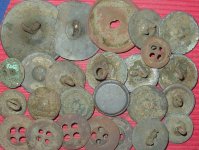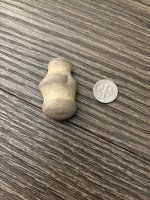Satori
Full Member
Tales of missing treasure abound in Pennsylvania
March 23, 2008
There are many tales of lost treasure in the hills, mountains and caves of Pennsylvania.
* Late in the 1690s, a group of French Canadians, led by Louis Frontenac, left New Orleans for Montreal. They sailed up the Mississippi River to the Ohio River and on to the site of present-day Pittsburgh, taking the left fork up the Allegheny River. On their rafts were kegs filled with gold coins destined for the Royal Governor of Canada's treasury. Upon reaching present-day Potter County, they started overland, but the heavy kegs made the going slow. Fearing an English or Indian attack, they buried the treasure north of present-day Coudersport, marking the spot with a cross chipped into a rock. Indians saw the cross, but left it alone fearing it had mystical significance. In time, the marker wore away and the Indians couldn't remember where it was located. The French never returned.
* During the Civil War, Confederate raiders captured a Union convoy heading from West Virginia to the Philadelphia Mint. The convoy's treasure — 15 tons of silver bars — was hidden in a cave north of Uniontown. The rebels never returned.
* David "Robber" Lewis made a reputation for himself in the early 1800s, robbing the rich and giving to the poor. He was captured in 1820 and, on his deathbed, told his jailers of three caches of gold. One, containing $10,000, was concealed in a small cave along the Juniata River near Lewistown. A second was buried along Conodoguinett Creek near the caves he used as a hideout. The third, containing $20,000, was buried in the hills outside Bellefonte. During his last imprisonment, Lewis is said to have taunted his jailers by telling them he could see the cache from the cell. None of the loot was ever found.
* In the 1890s, a man robbed a bank in Emporium, making off with $40,000 in cash. He got lost and ended up in the village of Hazel Hurst where he collapsed and died of "exhaustion" — but not before confessing he had buried the money northeast of Kushequa within sight of the Kinzua railroad bridge.
* On Oct. 11, 1924, a train carrying a safe with a $33,000 payroll inside was robbed outside the Cambria County town of Belsano. During the holdup, one of the men guarding the safe was killed. Police caught up with Michelo Bassi and Anthony Pezzi two weeks later in Terre Haute, Ind. Each had a gun and $3,000 in cash. Convicted of first-degree murder, the men were executed. The safe and most of the money were never recovered. Legend has it that it may be hidden near the holdup site.
* Somewhere in the Allegheny National Forest to the west of Tionesta is a cave reputed to be full of silver. In the late 1700s, a settler named Hill got lost and sought shelter in a cave for the night. Inside, he found veins of silver along the walls and ceiling and, in the floor, a pit filled with pure silver. He made his way home, but was unable to retrace his route to the cave. Hill's story was backed up by an early entrepreneur who traded liquor with the American Indians in exchange for furs and silver. When asked where they got all their silver, legend has it that they blindfolded him and took him to a cave matching the one described in Hill's story. Pure silver was found in Indian burial grounds near Irvine in Warren County, about 15 miles upstream from Tionesta. The cave has never been found.
* Other lost-treasure tales include that of an airplane carrying $250,000 in cash that crashed near Mount Carmel in 1948. The money was thrown from the plane just before the crash and was never found.
* Bandit Michael Rizzalo stole a $12,000 payroll in 1888 and was said to have buried it in a tin box on Laurel Run Mountain outside of Wilkes-Barre.
* In 1775, a gang of Tories hid $100,000 in gold coins in the Wernersville area. The loot was never found.
March 23, 2008
There are many tales of lost treasure in the hills, mountains and caves of Pennsylvania.
* Late in the 1690s, a group of French Canadians, led by Louis Frontenac, left New Orleans for Montreal. They sailed up the Mississippi River to the Ohio River and on to the site of present-day Pittsburgh, taking the left fork up the Allegheny River. On their rafts were kegs filled with gold coins destined for the Royal Governor of Canada's treasury. Upon reaching present-day Potter County, they started overland, but the heavy kegs made the going slow. Fearing an English or Indian attack, they buried the treasure north of present-day Coudersport, marking the spot with a cross chipped into a rock. Indians saw the cross, but left it alone fearing it had mystical significance. In time, the marker wore away and the Indians couldn't remember where it was located. The French never returned.
* During the Civil War, Confederate raiders captured a Union convoy heading from West Virginia to the Philadelphia Mint. The convoy's treasure — 15 tons of silver bars — was hidden in a cave north of Uniontown. The rebels never returned.
* David "Robber" Lewis made a reputation for himself in the early 1800s, robbing the rich and giving to the poor. He was captured in 1820 and, on his deathbed, told his jailers of three caches of gold. One, containing $10,000, was concealed in a small cave along the Juniata River near Lewistown. A second was buried along Conodoguinett Creek near the caves he used as a hideout. The third, containing $20,000, was buried in the hills outside Bellefonte. During his last imprisonment, Lewis is said to have taunted his jailers by telling them he could see the cache from the cell. None of the loot was ever found.
* In the 1890s, a man robbed a bank in Emporium, making off with $40,000 in cash. He got lost and ended up in the village of Hazel Hurst where he collapsed and died of "exhaustion" — but not before confessing he had buried the money northeast of Kushequa within sight of the Kinzua railroad bridge.
* On Oct. 11, 1924, a train carrying a safe with a $33,000 payroll inside was robbed outside the Cambria County town of Belsano. During the holdup, one of the men guarding the safe was killed. Police caught up with Michelo Bassi and Anthony Pezzi two weeks later in Terre Haute, Ind. Each had a gun and $3,000 in cash. Convicted of first-degree murder, the men were executed. The safe and most of the money were never recovered. Legend has it that it may be hidden near the holdup site.
* Somewhere in the Allegheny National Forest to the west of Tionesta is a cave reputed to be full of silver. In the late 1700s, a settler named Hill got lost and sought shelter in a cave for the night. Inside, he found veins of silver along the walls and ceiling and, in the floor, a pit filled with pure silver. He made his way home, but was unable to retrace his route to the cave. Hill's story was backed up by an early entrepreneur who traded liquor with the American Indians in exchange for furs and silver. When asked where they got all their silver, legend has it that they blindfolded him and took him to a cave matching the one described in Hill's story. Pure silver was found in Indian burial grounds near Irvine in Warren County, about 15 miles upstream from Tionesta. The cave has never been found.
* Other lost-treasure tales include that of an airplane carrying $250,000 in cash that crashed near Mount Carmel in 1948. The money was thrown from the plane just before the crash and was never found.
* Bandit Michael Rizzalo stole a $12,000 payroll in 1888 and was said to have buried it in a tin box on Laurel Run Mountain outside of Wilkes-Barre.
* In 1775, a gang of Tories hid $100,000 in gold coins in the Wernersville area. The loot was never found.




